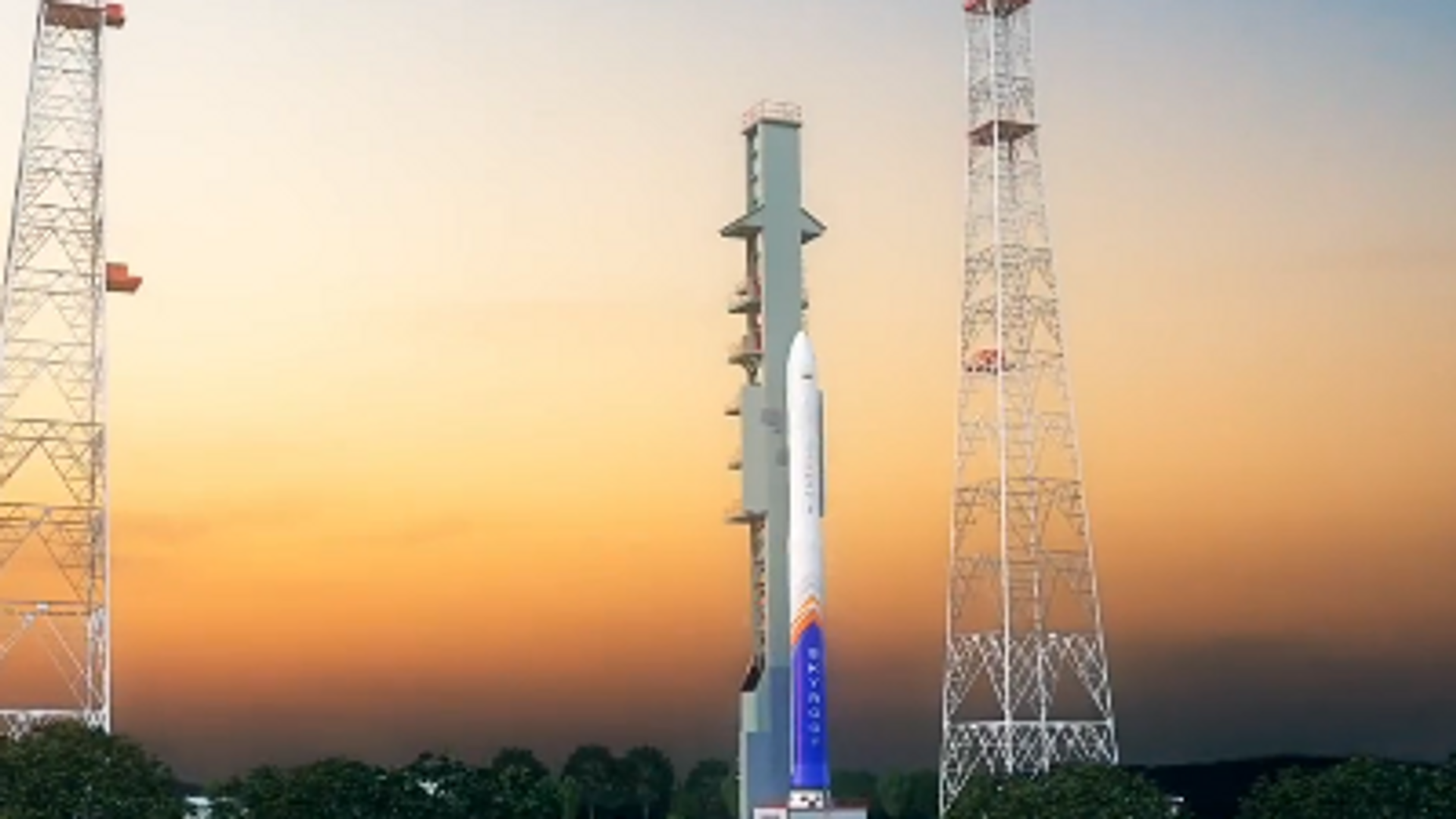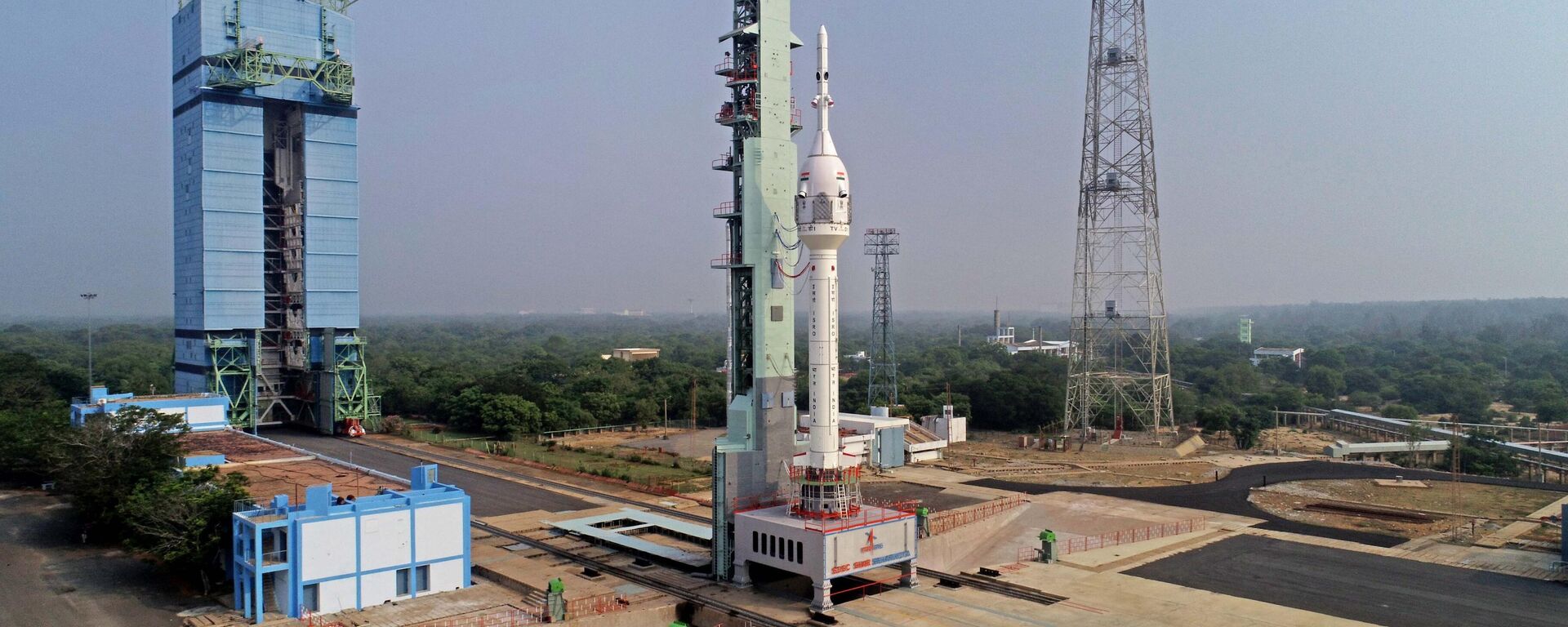https://sputniknews.in/20231025/skyroot-aerospace-set-to-launch-first-commercial-rocket-in-2024-5058321.html
Skyroot Aerospace Set To Launch First Commercial Rocket in 2024
Skyroot Aerospace Set To Launch First Commercial Rocket in 2024
Sputnik India
The Indian Union Minister inaugurated a new integrated design, assembly and manufacturing facility where Skyroot Aerospace will develop its first commercial... 25.10.2023, Sputnik India
2023-10-25T14:31+0530
2023-10-25T14:31+0530
2023-10-25T14:31+0530
science & tech
science & tech
rajnath singh
india
space satellite
space industry
militarization of space
space rocket
space exploration
union budget
https://cdn1.img.sputniknews.in/img/07e7/0a/19/5062501_65:0:465:225_1920x0_80_0_0_2adc2a007fae10e0457427e4ae05e23e.png
The city's rocket company Skyroot Aerospace is preparing to launch its first industrial rocket, called Vikram 1, early next year. Vikram 1 is seven storeys tall and has a payload capacity of up to 300kg. According to founder and CEO Pawan Chandana on Tuesday, "nano or cube satellites" from both Indian and international satellite companies have already agreed to be included.Indian Union Minister Jitendra Singh inaugurated the new 60,000-square-foot Max-Q facility and unveiled the Vikram 1 rocket, an all-carbon-fibre rocket capable of putting multiple satellites into orbit, with 3D-printed liquid engines.With two key tests to be completed in the coming months, Vikram 1 could be launched at any time between February and April. The rocket will use a combination of liquid and solid fuel in its upper stages to propel the spacecraft into orbit. "We will move forward based on the results of these tests. We won't have the full 300 kilograms of payload on the first flight because we want to use the observations to collect more data," Singh added.According to Chandana, Skyroot is one of the few companies that has been able to scale up the rocket. It also has the cost and time advantage to compete on a global scale because "we are forerunners."The space company now has four buildings with a combined built-up size of 100,000 square feet, making it one of the largest rocket development centres in the private sector worldwide.Follow Sputnik India on Google News!
https://sputniknews.in/20231021/india-successfully-conducts-first-space-rocket-launch-as-part-of-manned-program--4987536.html
india
Sputnik India
feedback.hindi@sputniknews.com
+74956456601
MIA „Rossiya Segodnya“
2023
Swapna Nair
https://cdn1.img.sputniknews.in/img/07e7/09/12/4320104_0:0:681:681_100x100_80_0_0_ca8a7d4d582609272840ffdd1cde7278.jpg
Swapna Nair
https://cdn1.img.sputniknews.in/img/07e7/09/12/4320104_0:0:681:681_100x100_80_0_0_ca8a7d4d582609272840ffdd1cde7278.jpg
News
en_IN
Sputnik India
feedback.hindi@sputniknews.com
+74956456601
MIA „Rossiya Segodnya“
Sputnik India
feedback.hindi@sputniknews.com
+74956456601
MIA „Rossiya Segodnya“
Swapna Nair
https://cdn1.img.sputniknews.in/img/07e7/09/12/4320104_0:0:681:681_100x100_80_0_0_ca8a7d4d582609272840ffdd1cde7278.jpg
skyroot aerospace, vikram 1, founder and ceo pawan chandana, international satellite, gmr aerospace and industrial park, vikram s, .indian union minister, jitendra singh, spacecraft, orbit, india, space industry, private sector
skyroot aerospace, vikram 1, founder and ceo pawan chandana, international satellite, gmr aerospace and industrial park, vikram s, .indian union minister, jitendra singh, spacecraft, orbit, india, space industry, private sector
Skyroot Aerospace Set To Launch First Commercial Rocket in 2024
The Indian Union Minister inaugurated a new integrated design, assembly and manufacturing facility where Skyroot Aerospace will develop its first commercial rocket - the Vikram 1.
The city's rocket company Skyroot Aerospace is preparing to launch its first industrial rocket, called Vikram 1, early next year. Vikram 1 is seven storeys tall and has a payload capacity of up to 300kg. According to founder and CEO Pawan Chandana on Tuesday, "nano or cube satellites" from both Indian and international satellite companies have already agreed to be included.
Speaking at the new integrated design, assembly and manufacturing facility at the GMR Aerospace and Industrial Park, Chandana said, "Vikram 1 will be a scaled-up version of our first successful rocket launch 'Vikram S' last year, in which we successfully tested our technology and became the first private company in the country to have the capability to launch the rocket into space.
Indian Union Minister Jitendra Singh inaugurated the new 60,000-square-foot Max-Q facility and unveiled the Vikram 1 rocket, an all-carbon-fibre rocket capable of putting multiple satellites into orbit, with 3D-printed liquid engines.
"We intend to test three commercial launch vehicles, and we are optimistic that we will successfully launch the first commercial rocket into orbit. Due to the limited number of businesses with this kind of orbital capabilities worldwide and the difficulty of gaining access to space, many satellite enterprises are taking the risk of putting their satellites on the rocket even if it is the first one, Singh added.
With two key tests to be completed in the coming months, Vikram 1 could be launched at any time between February and April. The rocket will use a combination of liquid and solid fuel in its upper stages to propel the spacecraft into orbit. "We will move forward based on the results of these tests. We won't have the full 300 kilograms of payload on the first flight because we want to use the observations to collect more data," Singh added.
India is no longer seen as a country to be led by other countries, according to Singh, who claimed that India is now in a position to lead other countries in the space industry.
According to Chandana, Skyroot is one of the few companies that has been able to scale up the rocket. It also has the cost and time advantage to compete on a global scale because
"we are forerunners."Chandana said Skyroot Aerospace has raised $52.6 million in funding so far, which should help with the. "In the future, this location will have its own testing facility. The government and I are in conversation," he added.
The space company now has four buildings with a combined built-up size of 100,000 square feet, making it one of the
largest rocket development centres in the private sector worldwide.



